April 2019
|
| |
|
Romans 7:13
|
“There is no real joy in this world except that
which the Word brings when it is believed.”
[Luther’s
Works
4:4]
|
Romans 7:13 is another verse that has
significantly shaped my work as a pastor. It was
pressed upon me by Luther’s great Lectures on
Galatians (1535). The verse says that the law of
God is to make sin sinful “beyond measure.”
Luther elaborates this startling point saying
that sin must be “increased, inflated, inflamed,
and magnified” (Luther’s
Works
26:314). But who wants to do that? Once over
lightly is best, if not at all. But why? Is our
sinfulness so harrowing that no one can bear
having it inflamed before our very own eyes?
|
Well, yes, that’s clearly the case. And so we
substitute this verse with the home spun wisdom that the
difficulties of this life reveal our sin to us and so we
don’t need to have the law preached to us on Sundays to
make it real. Life does that, and it’s already painfully
clear enough.
Well, this wisdom isn’t divine at all. No, it’s
in fact wrong. It’s a bum steer and a dodge.
The Lutheran Confessions
(1580) make this clear. There we’re told that the Law,
along with the Gospel, “must be urged constantly and
diligently in the church of God until the end of the
world,” so that “the law and its threats will terrify
the hearts of the unrepentant and bring them to a
knowledge of their sin” (The
Book of Concord,
ed. T. Tappert, p. 562). Why? So that sinners, on “the
brink of despair,” may be comforted – being impelled and
“driven to Christ.” Anything milder will not work.
Anything else leaves us without “access” to grace; and
no “place” for the Gospel (Luther’s
Works
26:315).
Where does that then leave me? Romans 7:13 and Luther
have pushed my sermons into the land of terror and
threats – that all may come to Christ.
—Pastor
Marshall
|

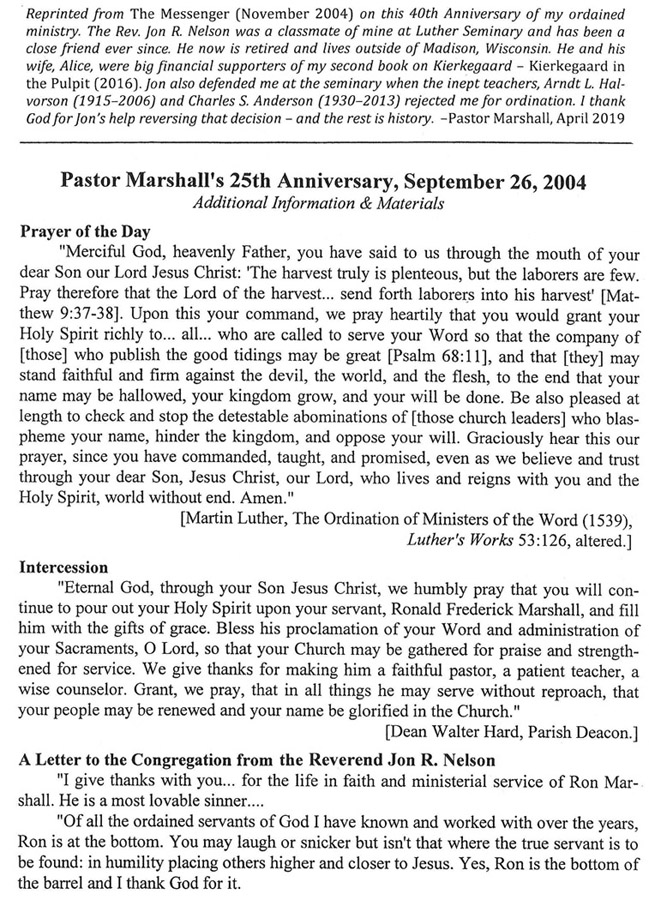
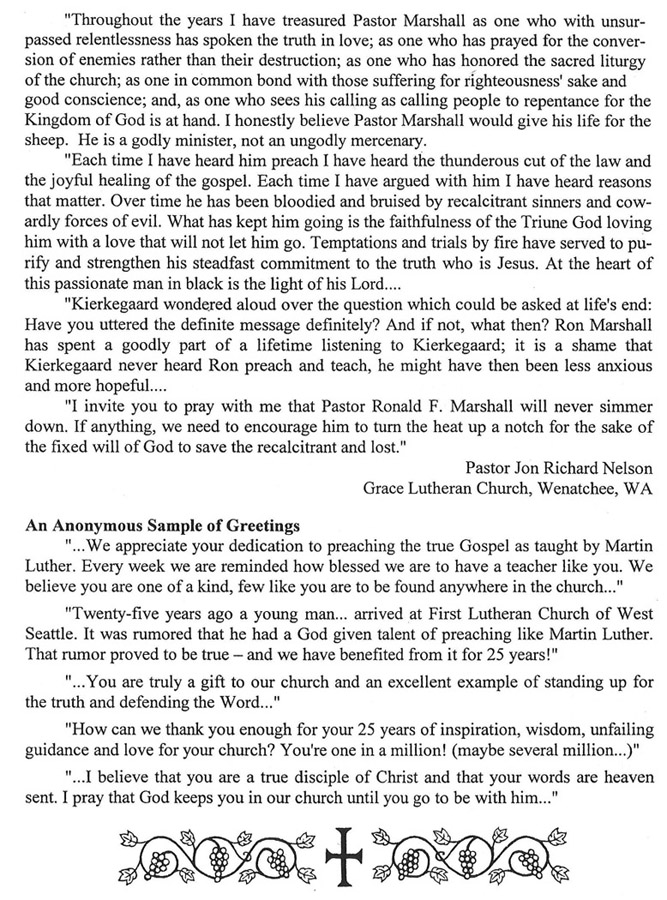
|
| |
|
President’s Report…by
Cary Natiello
I subscribe to a news source on my smartphone.
This article caught my eye:
A
Muslim man in Egypt set out to kill his cousin who had
reportedly converted to Christianity.
He followed his cousin to where he worshiped and
quietly sat behind him during a service.
The article says that the Muslim man was so
deeply touched by the songs and worship service and that
once he saw the way his cousin was living his life
through the salvation of Jesus Christ, the man's life
was changed forever – he too converted to Christianity
and was baptized like his cousin.
The article was published by OPEN DOORS USA, a
non-profit organization that works in the world's most
oppressive countries, empowering Christians who are
persecuted for their beliefs.
Based on some limited research, I believe OPEN
DOORS is a legitimate and reliable non-profit
organization.
Intrigued by this article I started digging a
little further.
It is easy to admire the apparent devotion of Muslims to
their religion and Allah because of their public display
of devotion.
With their daily group prayer and living in a
society with one religious belief it is hard to think
otherwise.
It may even make devoted Christians appear less so by
comparison.
But after doing some research on this subject I now
understand that the lack of freedom of religion is a
center driving force among Muslims.
Through a little more reading I found there is a
consensus that Muslims are becoming disillusioned with
their religion and converting to Christianity in record
numbers across the globe.
One article I read surmises it is because of the
violence of Islamic terrorists.
That seems logical to me.
Further reading of other opinions is that
in almost every Muslim-majority nation,
the
authoritarianism, violence, bigotry and patriarchy all
in the name of Islam is alienating people.
In these Muslim-majority nations oppression and
violence is perpetrated all in the name of religion.
Maybe you are aware that
converting from Islam to Christianity is seen as a
betrayal of their family and heritage. In Muslim
families, any member who leaves their Muslim beliefs and
upbringing subjects themselves to tremendous pressure
from their immediate and extended family to renounce
Christ and return to Islam.
Some are locked up, others are isolated, tortured
or even killed.
It is no wonder that Muslims are becoming
disillusioned.
Especially when they are exposed to Christianity,
the words of the Scriptures, the forgiveness of sins
through Christ, and the love of their neighbor.
I wondered if I lived in a country where there
was no freedom of religion and I was prohibited from
being a Christian, would my faith be strong enough for
me to face the possibility of being locked up, isolated,
tortured or even killed, all in the name of
Christianity.
Please consider remembering in your prayers the
persecuted Christians around the world that they
may be protected and continue to have the
strength to continue the good fight of faith in
Christ.
And give thanks to God that we live in a
country where freedom of religion is a right of
the people.
FINANCES:
YTD February our giving units have
contributed $40,200 to our church against a
budget of $34,800.
Our total expenses are basically on
budget at $44,000 against a budget of $43,300.
Thank you to everyone keeping up with
their giving.
We are on a good trajectory with regards
to our giving.
Blessing to you all. |
 |
|
|
| |
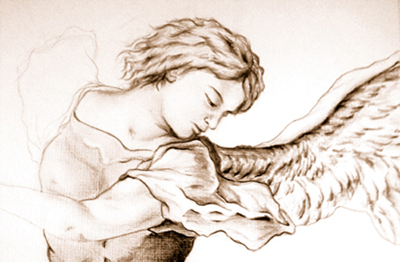
Holy Week
and Easter
April 14
Sunday of
the Passion
8:00
am
Holy Eucharist - Chapel
9:00 am
Church School Passion Faire
10:30 am
Holy Eucharist – Procession with Palms
8:00 pm
Compline
April 15
Monday in
Holy Week: Jesus’ Cleansing
of the
Temple
11:45 am
Holy Eucharist - Chapel
7:00
pm
Vespers
The Great Litany - Chapel
April 16
Tuesday in
Holy Week: Anointing Jesus for Burial
11:45 am
Holy Eucharist - Chapel
7:00
pm
Vespers
The Great Litany - Chapel
April 17
Wednesday
in Holy Week: The Betrayal of Jesus by Judas
9:30
am
Matins - Chapel
11:45 am
Holy Eucharist - Chapel
7:00
pm
Vespers
The Great Litany - Chapel
April 18
Maundy
Thursday: The Last Supper
11:45
am
Holy Eucharist - Chapel
7:00
pm
Solemn Eucharist
Stripping of the Altar
April 19
Good
Friday: The Crucifixion of Our Lord
11:45 am
Holy Eucharist - Chapel
(Reserved Sacrament)
7:00
pm
Office of Tenebrae
A Liturgy of Lessons, Hymns and Prayers
April 20
Holy
Saturday: The Burial of Our Lord
11:45
am
Liturgy of the Burial - Chapel
Easter
Vigil
7:00
pm
Liturgy of Light, Readings, Baptism
and Holy Eucharist
April 21
The
Resurrection of Our Lord – Easter
9:00 to 10:00 am
Easter Brunch in the parish hall.
10:30 am
Festival Eucharist
8:00 pm
Compline
|
|
| |
STEWARDSHIP
Stewardship
Opportunities
We
are to be good stewards of the earth, our church, and
our community.
Stewardship is not only tithing to the church,
but it is also about giving our time, knowledge, and
effort. To
learn how to be a good Christian steward also requires
that we are devoted to the word of God.
I have been thinking about all the various
stewardship opportunities right here at our church and
community.
I have listed a few ideas below that I thought I would
share with you:
·
Participate with your
assigned service team (and help out for big events like
the Easter brunch even if it is not your assigned team)
·
Signup for flowers on
the church flower chart
·
Ask Dean if there are
any chores around the church or grounds that you can
help with (e.g. pressure washing, weeding, cleaning,
washing, etc.)
·
Volunteer your time at
the West Seattle
Food Bank or the
West Seattle
Helpline
·
Bring the suggested food
donations to the church, or directly to a food bank
·
Participate in St.
Nicholas Fair
·
When buying something
from Amazon,
do so via Amazon
Smile and designate
First Lutheran
Church of West Seattle as your charitable designee
so a percentage of your purchase goes to the church from
each purchase
·
Donate clothing to the
West Seattle Helpline’s
Clothesline.
To donate
clothing, you can drop items off at The
Clothesline (4401 42nd Ave SW,
Seattle)
on any Tuesday, Thursday or Saturday between 11:30 am –
1:00 pm.
·
Take care of the earth.
One idea is to learn how to reduce your carbon
footprint by going to:
https://www.carbonfootprint.com/measure.html
·
Tithe (10% of your income) to our church – I recently
read that
Christians are giving at 2.5% of their income to their
church; during the Great Depression it was 3.3%.
How are you doing?
·
Add our church to your estate planning and/or give
designated gifts to the church above and beyond your
regular giving
·
Give money to other charitable organizations,
especially ones in our
extended ministries
that you give to directly through our church
·
Complete your pledge cards each year for the church
·
Attend the different
church services like Matins, Vespers and during Holy
Week
·
Attend the Wednesday
evening Bible class and/or Sunday Adult education
·
Serve on the church
council
I
found it a good exercise to remind myself where I could
do more to be a good Christian steward and that there is
always room for improvement.
If you have other ideas for stewardship at our
church or community, I would enjoy hearing from you.
Cary Natiello, Church
Council President
|
|
| |
|
God & Keeping Track
by Pastor Marshall
We
have not always kept track of our spending. Neither have
governments. In his book on this story,
The Reckoning:
Financial Accountability and the Rise and Fall of
Nations (2014), Jacob Soll says that book-keeping
started around 1300 in northern Italy (pp. xiv, 12–13).
This transformed Christianity, as well, seeing faith and
math to be partners, according to John 19:11, which has
the secular being empowered by God (pp. 39, 23, 74). Now
being good at business was goodness itself (Proverbs
22:29) (p. 151). Indeed, the road to “trust and goodness
was through the clarity of mathematics and how data were
recorded in books” (p. 51). Now you could read the books
and not have to “rely on the treasure’s word” (p. 78).
“Open good books were open good government” (p. 139).
That keeps profit and loss “known at all times” (p. x).
Accounting gave reason a place in Christianity!
But since “good accounting meant facing the truth
when the news was bad” (p. ix), we have looked for ways
to cheat in book keeping. The easiest way was to “keep
two sets of books,… showing one to the buyer and the
other to the seller” (p. 53). The other way was to make
things so complex and difficult that the truth could be
hidden in the very accounting itself (pp. x, xvi, 48,
205–6). Think of the Pentagon. It was given thirty years
to prepare an audit and then it failed – all because it
is too big to keep track of (“The Pentagon Doesn’t Know
Where Its Money Goes,”
The New York
Times,
December 1, 2018).
But then it’s also the case that figures lie and liars
figure (p. 180).
– saying
something close to what Thomas Carlyle said back
in 1839 (p. 180). Therefore every accounting
reform that tries to make book keeping better is
“resisted,” due to our sinfulness (p. 206).
What is the way out of this mess? Soll
says by seeing “the numbers of accounting as an
integral part of society and culture” (p. 208).
That, unfortunately, is only the aspiration but
not the means to get there. And that brings us
back to faith and Christ, in Soll’s history (pp.
38, 53). |
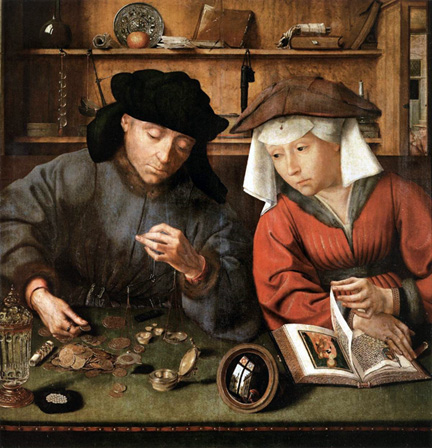 |
|
|
| |

Thank you
to the
congregation
for the
bonuses!
From the Senior Staff
|
|
| |
|
ANNOUNCEMENTS:
FREE MONEY?
Sign up for the
Bartell
Drugs loyalty card program and designate
First Lutheran Church of West Seattle.
4% of your purchases will be automatically donated to the church.
|
 |
Also
Amazon.com has a program called
Amazon Smile
that one can sign up for that works in a similar
fashion.

WEST SEATTLE HELPLINE:
Get your tickets ASAP on the W.S. Helpline web page to
the very popular
Taste of West Seattle.
This annual event planned for Thursday, May 23rd,
is in its 14th year.
This is a true taste of what West Seattle has to
offer in food, wine and brews.
Must be 21.
SUNDAY EDUCATION:
A Fast Gospel: Reading Mark, the Shortest Gospel.
In this eight week class starting April 7th, we will
study The Gospel of Mark.
Mark’s Gospel
has the latest beginning in Jesus life (with no birth or
infancy stories). It
also has a strange ending that will be explored.
WEST SEATTLE FOOD BANK BENEFIT:
The 12th Annual
Instruments of Change
Benefit Dinner
is planned for Saturday evening, May 11th, this year.
There will be a
Happy Hour with games, Liquor Tasting and great items in
our Silent Auction.
Then enjoy a
3-Course dinner by Tuxedo and Tennis Shoes with a
dessert dash.
This fundraising event is at the Seattle
Design Center,
5701 6th Ave S.
Tickets: $125 or $1,250 for a table.
Lifetouch Church Directories:
We now have the new church directories in the
office. On
Sundays there will be a stack available on the Narthex
table at the back of the church.
Please take one copy per family.
Those who are not able to pick up their directory
in person will have theirs mailed.
Thanks to Sonja for a beautiful directory!
SERVICE TEAMS:
The
Service Team Lists are going to be updated soon.
The office will be working on a few suggested
ideas.
Please note that if one team is not supplying the number
of helpers needed requesting help from another team can
be useful.
The next event is Easter Brunch and Service Team 3 will
be on duty.
HELP NEEDED LIST:
Please note that the following jobs need regular
or at least yearly attention:
Pressure washing the outside walkways and steps,
Memorial courtyard clean up and weeding, south courtyard
clean up and weeding, cleaning out of the four window
wells, cleaning of the outside stairwells, washing and
sanitizing of the nursery and church kitchens.
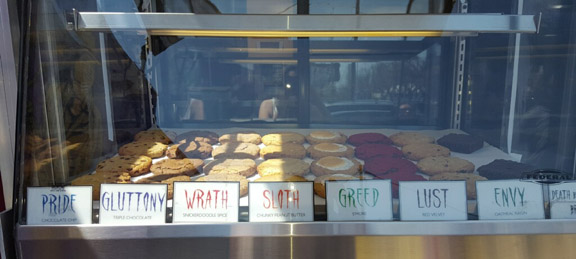
A dessert
wagon on the streets of Austin, Texas, March 2019.
|
|
| |
|
That Terrible Storm
December 26, 2004
by Pastor Marshall
Fifteen years ago one of the worst disaster ever, struck
coastal lands on the Indian Ocean, after an earthquake
unleashed a terrible tsunami. A survivor of that storm,
Sonali Deraniyagala, has written about it in her award
winning book,
Wave, 2013. She lost her husband and four children
that day – when more than 250,000 people died
altogether! “The wave was more than thirty feet high
here. It moved through the land at twenty-five miles an
hour. It charged inland for more than two miles, then
went back into the ocean” (p. 71). The loss she has had
to live with has often been “too potent” for her (p.
227). A year after the deaths she writes: “I walked down
to the ocean alone. It was June, when the surf here is
wild. I stared. These waves, this close. I stood there
taunting the sea, our killer. Come on then. Why don’t
you rise now? Higher, higher. Swallow me up.” (p. 72).
Survivor’s guilt plagued her: “I recoil at my
desolation. How I have fallen. When I had them, they
were my pride, and now that I’ve lost them, I am full of
shame. I was doomed all along, I am marked, there must
be something very wrong about me. These were my constant
thoughts in those early months. Why else did we have to
be right there just when the wave hit? Why else have I
become this shocking story, this wild statistical
outlier? Or I speculated that I must have been a mass
murderer in a previous life, I was paying for that now.
And even as I have discounted each possibility over
time, shame remains huge in me” (p. 112).
While
reading this book and thinking about the horror of it
all, I kept going to back to Matthew 8:17, which was not
included in this book but could have made all the
difference – “Jesus took our infirmities and bore our
diseases.”
|
|
| |
Isaiah 8.13
Monthly Home Bible Study, April 2019, Number 314
The Reverend Ronald F. Marshall
Along with our other regular study of Scripture, let us
join as a congregation in this home study. We will
study alone
then talk informally about the assigned verses together
as we have opportunity. In this way we can "gather
together
around the Word" even though physically we will not be
getting together (Acts 13.44). (This study uses the RSV
translation.)
We need to support
each other in this difficult project. In 1851
Kierkegaard wrote that the Bible is "an extremely
dangerous book.... [because] it is an imperious book...
– it takes the whole man and may suddenly and radically
change... life on a prodigious scale" (For
Self-Examination). And in 1967 Thomas Merton wrote
that "we all instinctively know that it is dangerous to
become involved in the Bible" (Opening the Bible). Indeed this word "kills" us (Hosea 6.5) because
we are "a rebellious people" (Isaiah 30.9)! As
Lutherans, however, we are still to "abide in the womb
of the Word" (Luther's
Works 17.93) by constantly "ruminating on the Word"
(LW 30.219) so
that we may "become like the Word" (LW 29.155) by thinking "in the way Scripture does" (LW
25.261). Before you study then, pray: "Blessed Lord, who
caused all holy Scriptures to be written for our
learning: Grant us so to hear them, read, mark, learn
and inwardly digest them, that we may embrace and ever
hold fast the blessed hope of everlasting life, which
you have given us in Our Savior Jesus Christ. Amen"
(quoted in R. F. Marshall,
Making A New
World: How Lutherans Read the Bible, 2003, p. 12).
And don’t give up, for as Luther said, we “have in
Scripture enough to study for all eternity” (LW 75:422)!
Week I.
Read Isaiah 8.13 noting the words
fear and
dread. Why are
we to stand in fear and dread of God? On this read
Isaiah 8.12 noting the phrase
what they fear. And what is it that they fear? On this read Isaiah
41.8–13 noting the words
incensed,
strive,
contend and war. Why are
we to fear God instead of those who make life so
difficult for us? On this read Matthew 10.28 noting the
contrasting words
kill and hell.
What so scary about hell? On this read Luke 16.19–31
noting the double use of the word
torment.
What’s so tormenting about hell? On this read Mark 9.48
noting the words fire and worm. Why should
we be so tormented in hell? On this read 2 Thessalonians
1.8 noting the line
do not obey the
gospel of our Lord Jesus. (See also John 3.36.) Why
is disobedience such a terrible infraction? On this read
John 3.30 noting the stark contrast between our
decrease and Christ’s increase.
Our obedience and praise
enthrones
Christ – says Psalm 22.3. This explains why our
disobedience is so severely punished. What do you think
of that?
Week II.
Read again Isaiah 8.13 noting those same words
fear and
dread. Why is it that we don’t fear God then? On
this read Psalm 90.11 noting the question
Who considers…thy wrath according to the fear of thee? What’s behind
this neglect? On this read 1 Timothy 1.17 noting the
word invisible.
How trenchant is this? On this read Exodus 33.20 noting
the correlation between
seeing God and dying. Read
as well John 1.18 and 1 John 4.12 noting the line
no man has ever seen God. Does God’s invisibility make it tougher to
obey him? On this read Psalm 10.11 noting the phrase
hidden his face. Is it that what’s invisible can’t measure up the
visible? ‒ so they’re cut off from one another? On this
read Proverbs 5.21 noting the line
he watches all his
paths. How does the invisible, incorporeal One have
eyes to see to do that? On this read 1 Samuel 16.7
noting the line
the Lord sees not as man sees. Does that mean that
God sees us but without having anything like our eyes?
Is that why the Bible speaks of God’s eyes but not of
his eyebrows? (Ludwig Wittgenstein,
Lectures &
Conversations… on Religious Belief, 1972, p. 71). So
do we only fear what we can see
‒ and not “things that go bump in the night” (1926
litany)?
Week III.
Reread Isaiah 8.13 noting again the words
fear and
dread. Why does Psalm 34.11 tell us that we must be
taught to fear God? Is it because what is visible about
God is what he does and not himself? On this read
Ezekiel 14.21 noting the words
sword,
famine, beast and
pestilence.
Are we to fear God because of these terrible things that
he sends our way? On this read Numbers 16.32 noting the
words opened
and swallowed.
What person could do that? Did God do that in Korah? On
this read Number 16.20 noting the line
that I may consume
them in a moment. Read also Numbers 16.30 noting the
word creates.
Does that settle it? On this read John 12.28–29 noting
the play between the two words
voice and
thundered. Why the ambiguity? On this problem read also 1 Samuel 3.8
noting the words
then and
perceived. Was this based on a process of
elimination? If so, why were the only two choices Eli or
God speaking? Could Samuel have been delusional? Could
there have been another person sleeping there? On this
problem read 1 Corinthians 13.12 noting the line
now we see in a
mirror dimly. Does that apply to everything or just
religious phenomena? Do
we have built in limitations?
Week IV.
Read Isaiah 8.13 one last time noting again the words
fear and
dread. With these impediments, how can we switch
from fearing visible things and people to the invisible
God? On this read Isaiah 43.5 noting the words
with, bring and
gather. Is
that enough? On this read Isaiah 29.13–16 noting the
words fear,
commandment
and rote. What’s wrong here? On this read Isaiah 66.2 noting the word
trembles.
Without this affective element our fear is insincere.
Such fright and trembling is what carries us from the
wrong fear to the right one. Do you agree? If so, why?
|
|
| |
 PARISH PRAYERS
PARISH PRAYERS

Remember in prayer before God those whom He has made
your
brothers and sisters through baptism.
Garth Olson, Chuck Prescott, Pete Morrison, Emma Sagmoen,
Eileen & Dave Nestoss, Aasha Sagmoen & Ajani Hammond,
Connor Sagmoen, Matt Anderson, Tabitha Anderson, Diana
Walker, The Rev. Paul Smith, The Rev. Dan Peterson,
Sheila Feichtner, Deanne & Lucy Heflin, Jim & Hillary
Thoren, Marylou & Paul Jensen, Chris & Margeen Boyer,
Antonio, Jessica, Jeff Walkenhauer, Rebecca Brown, Randy
& Mary Leskovar, Jim Trotter, Adam & Jennifer Jones,
Mike & Kathy Harty, Sharon Cooper, Viki Horat, Cydney
Stockton, Kim Hiorth, Margaret Johnson.
Also, pray for unbelievers and that the USA be
righteous and caring.
Pray for the shut-ins that the light of Christ
may give them joy: Bob & Mona Ayer, Bob & Barbara Schorn,
Joan Olson, Chuck & Doris Prescott, C. J. Christian,
Dorothy Ryder, Lillian Schneider, Crystal Tudor, Nora
Vanhala, Mary Goplerud, Anelma Meeks, Martin Nygaard,
Gregg & Jeannine Lingle.
Pray for those who have suffered the death of a
loved one:
Pray that God will bear their grief and lift their
hearts:
Pray for the family and friends of Kenneth Sund who died
at Providence Mount St. Vincent’s in West Seattle, March
19th.
A graveside liturgy with Pastor Marshall will be
on March 28th, 1 pm, at Washelli.
Pray for our bishops Elizabeth Eaton and Brian
Kirby Unti, our pastor Ronald Marshall, our deacon Dean
Hard and our cantor Andrew King, that they may be
strengthened in faith, love and the holy office to which
they have been called.
Pray for our synod elections of a new bishop.
Pray that God would give us hearts which find joy
in service and in celebration of Stewardship.
Pray that God would work within you to become a
good steward of your time, your talents and finances.
Pray to strengthen the Stewardship of our
congregation in these same ways.
Pray for the hungry, ignored, abused, addicted,
and homeless this Easter.
Pray for the mercy of God for these people, and
for all in Christ's church to see and help those who are
in distress.
Pray for our sister congregation: El Camino de
Emmaus in the Skagit Valley that God may bless and
strengthen their ministry. Also, pray for our parish and
its ministry.
Pray that God will bless you through the lives of
the saints: Albrecht Dürer, painter, 1528; Dietrich
Bonhoeffer, teacher, 1945; Saint Mark, Evangelist;
Catherine of Siena, teacher, 1380.
|
|
A Treasury of Prayers
O God, heavenly Father, I cannot live
without your blessing. Life is too hard and my duties
are too great. I come before you with meekness asking
for your help and strength. Give me good cheer. Help me
encourage others. May I always be a benediction to all I
meet – giving Christ all the glory. In His dear name I
pray. Amen.
[For All
the Saints I:998, altered]
|
|
| |
|


